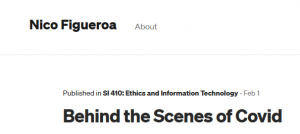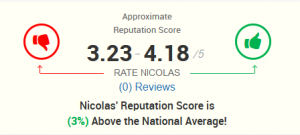Difference between revisions of "Nicolas Figueroa"
(→People Call Me Nico) |
|||
| Line 3: | Line 3: | ||
== People Call Me Nico == | == People Call Me Nico == | ||
| − | I think my name is the best place to start, concerning | + | I think my name is the best place to start, concerning my real identity. I love telling people that, no, Nico isn’t my real name, along with explaining how I’m not from somewhere cool, just my dad is. Names try to be our unique identifiers, but that doesn't apply in this digital realm, considering the breadth of the internet. My name is very common where my dad is from but sparsely heard here in the United States. This makes it easy to dismiss results from any search engine that appear in Spanish because I’ve never had a real identity in South America, let alone a digital one. |
| − | There are plenty of other identifying traits that are | + | There are plenty of other identifying traits that are used for categorization the internet, and in order to better critique my findings through search engines, I want to include some personal qualities which I feel define me. I love to code, play tennis and walk my dog. My car breaks all the time and I love to fix it. My family all lives in Ann Arbor and they are much cooler than I am, so I won’t be surprised when they show up more than I do. I attended Washtenaw Community College before transferring to the University of Michigan, and I graduated high school nearby UofM in 2016. I am using all this as a threshold to determine the depth to which I can be revealed through Google and Bing. |
== The Hunt == | == The Hunt == | ||
Revision as of 14:44, 19 February 2021
My presence on social media during high school played a cyclical role in my self-consciousness and fear of judgement. I had used Facebook for a few years along with Twitter, but my Instagram didn't contain my real name and now holds a lonely picture of my favorite car. I have made a deliberate transition away from using social media since graduating high school in 2016 in order to focus my energy on connecting with people around me. I became far less shy after working at my first job and discovered the real difference between meeting people in real life as opposed to online where I much prefer the former. My foremost goal concerning my digital identity is to be as inconspicuous as possible in order to prioritize interactions in the real world. I have always wondered, does my digital identity reflect these intentions?
Contents
People Call Me Nico
I think my name is the best place to start, concerning my real identity. I love telling people that, no, Nico isn’t my real name, along with explaining how I’m not from somewhere cool, just my dad is. Names try to be our unique identifiers, but that doesn't apply in this digital realm, considering the breadth of the internet. My name is very common where my dad is from but sparsely heard here in the United States. This makes it easy to dismiss results from any search engine that appear in Spanish because I’ve never had a real identity in South America, let alone a digital one.
There are plenty of other identifying traits that are used for categorization the internet, and in order to better critique my findings through search engines, I want to include some personal qualities which I feel define me. I love to code, play tennis and walk my dog. My car breaks all the time and I love to fix it. My family all lives in Ann Arbor and they are much cooler than I am, so I won’t be surprised when they show up more than I do. I attended Washtenaw Community College before transferring to the University of Michigan, and I graduated high school nearby UofM in 2016. I am using all this as a threshold to determine the depth to which I can be revealed through Google and Bing.
The Hunt
Methodology
My high level goal while building this digital identity was to critique how well I have stayed out of search engines, foremost because I already know that I don’t have any social media profiles. I tried to do a range of queries and speak only about the few that returned results. For both search engines I started with “Nico Figueroa” and then expanded on the entry to include more intimate details in the hopes of uncovering dark secrets. The most detail I appended to my name was my hometown, high school and other details that might be plausible to discover from talking to me in real life.
A Whole Lot of Nothing
The most expected results from Bing are the first blog post I wrote for a class at the University of Michigan, SI410, a few weeks ago, along a few articles about my tennis career in high school. There is one picture that is captioned as containing me, but the link is broken so I can't yet claim any fame that could be attributed to the photo. These initial results align well with the scope in which I feel comfortable being represented online and although the blog post I wrote reveals some details about my workplace, I believe in the transparency of a company with its community. So far, no discomfort has been discovered.
False Positive
Bing uncovered one result that gifted me some misgivings: a search engine listing for mylife.com, which described exactly my age, an address and the names of all my immediate family! It showed up at the cost of "Nicolas Figueroa Ann Arbor", which would be an easy leap for anybody checking up on me. I will absolutely admit to being anxious to click the link, but we all know that the story must come first.
I felt a small bit of relief when the page loaded, revealing data which was out of date and clearly gathered from public government records. The address posted was the one on my driver's license from when I still lived with my parents, there were no photos linked and the most identifying information listed was my age. There was a summary section with names of people who live around my parents, but they were almost five years old and represent easily attainable public record. The part I found most humorous and disingenuous was an “Approximate Reputation Score” which you can only investigate if you start handing over your credit card digits.
I experienced slim pickings with Bing, so I was curious to see if the trend would continue with Google.
We Say, "Google It" For a Reason
The all-knowing Alphabet Inc. gave me some more personal results, possibly revealing the first crack through my digital armor. The only result for “Nico Figueroa” that I came across through this entire endeavor was on page 2 of the Google search page, where my GitHub profile and history shows up. I wasn’t too impressed by this because my username is uniquely @NicoFigueroa, and after all, the site is a place to host Open-Source software. It stands to reason that my public repositories are on display for the world to see. No problems there, I don’t mind sharing my “professional” work with the world.
Two more listings I felt merited mentioning, the first of which is a link to a Washtenaw Community College list of Honors Students from 2020 which nobody had bothered to invite me to. The second is another tennis website which broadcasts my losing record during my time in Rec&Ed tennis career. Again, there is a clear distinction to me between finding a picture of myself from a private profile and these news articles or school events. So far, I would like to report that I am satisfied with the results of my effort to remain as anonymous as possible.
The Empire Strikes Back
After typing in every combination of my name along with personal details I could think of, the only information that named me personally are “People Search” websites, which promise intimate details about the person in question. I investigated the site truthfinder.com as carefully as possible to find where they are getting this information and what my rights are to remove it.
That site cites its sources as government records with offerings such as: “Criminal and arrest records” or “Social media profiles”. The list continues to mention they scrape deep web information and social media data in order to build an accurate profile of every person in the United States.
The scariest part about these sites I stumbled upon is the inclusion of my family members and their last known addresses are listed right next to mine. I’m glad that there is very bare bones information procurable about any of them, but it is still very unsettling to me to know that it is so easy to find out the connections to people I care about through what the government deems acceptable to release publicly. Although I’m uncomfortable with a certain brand of website that I appear on, I must admit that there is far less information available through Google and Bing than I expected to find. I am comfortable with the level of exposure that I appear at, at least with medium effort searching.
The Verdict
The most intriguing facet of my digital profile to me is whether my lack of public information has truly affected my real life in the way that I hope. I was very happy to find that I had a difficult time uncovering any dirty laundry about myself, aside from records which could be physically attained through City Hall.
To answer my own question from the beginning of this journey, I would say that my data identity does reflect my digital intentions. The second part is the convoluted answer, where I cannot say with certainty that this change I am trying to make has resulted in bettering myself and the people around me. The strongest quality that I have noticed improving in myself since giving up social media is how much more I try and understand other people's point of view. It can be so difficult to see people as people, especially online, but I have found that my secession from an online presence has nudged me in the right direction.


